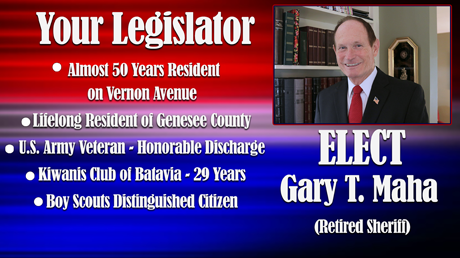Gary Maha
Ed DeJaneiro says he's ready to face challenge for District 9 seat by Gary Maha
Former Sheriff Gary Maha has decided to run for the District 9 seat on the County Legislature and incumbent Ed DeJaneiro is taking it all in stride.
He's faced opposition before, he said, and hopes come election day voters will look at his long years of service to the community and 10 years experience in the Legislature and decide in his favor.
"I respect that fact that he wants to run for this office," DeJaneiro said. "I think it’s critical though that they look at what’s going on right now before they make the final decision to vote for one or the other. There are things related to many, many years of understanding and experience in regard to some of these decisions coming up. It’s more than just the jail. Mr. Maha is a wonderful person and I’m sure he means well, but I think there is a large learning curve."
After Maha decided to run, DeJaneiro said he got a courtesy call from the former lawman and DeJaneiro said Maha told him he wanted to work on the jail project.
The county is being pressured by the state to replace its decades old and outdated jail with a new facility.
Reached while on vacation, Maha said it's more than just the jail that interests him in a seat on the County Legislature. He thinks his years of leadership experience and training will be an asset on an array of issues. He thinks he can help the Legislature prioritizing the use of the county's resources rather than just turn to the taxpayers for more money. But, yes, the jail is important and he's got some experience with the topic.
"I told him I think I could be an asset to voters of District 9 when it comes to the topic of building a new jail because I operated a jail for 29 years," Maha said.
That isn't the only issue that interests him, he said. (We'll talk with Maha in more depth about his reasons for running and other county issues when he's back from vacation).
DeJaneiro has indicated he favors looking more closely at a shared services agreement with another county.
"With the jail, in particular, we have to look at things very closely in respect to our needs and if there is any opportunity to build a joint jail with another county, and other counties that have the same criteria as we do, whereby the state is requiring them to have a more modern jail," DeJaneiro said. "We’re all going to be faced with the same expensive task of building a new jail, and I mean expensive. I’m talking around $35 million."
There are other issues facing the county, DeJaneiro said, where he thinks his experience is an advantage.
"I’ll tell you, it’s one of those situations where I have worked hard for residents and I’m very concerned about some of the upcoming things such as property taxes," DeJaneiro said. "Property taxes are something that is really hurting us more than we think. Everything is based on and paid for by property taxes. We don’t collect income tax and property taxes is something I’m concerned about. We have a lot of upcoming expenses and things happening."
He's especially focused, he said, on protecting the city's share of the county's sales tax.
"I'm working really hard on trying to make sure the county, Geneses County, lives up to what they promised the City of Batavia in respect to shared sales tax, which means millions of dollars for the City," DeJaneiro said. "Without that, we’re not in good shape in the city if we don’t continue to get our share of the sales tax."
The other big issue, DeJaneiro said, is water.
"The water situation in Genesee County is one that we need more water distributed to various portions of the county that don’t have it and need it, but again, it’s a very expensive ordeal," DeJaneiro said. "That wouldn’t necessarily mean our property tax. It is a special fund for that, but still an expense and we have to watch out for our residents, especially those on a fixed income, which is many of us."
News partner WBTA contributed to this story.
Through 50 years in law enforcement, Gary Maha has held himself to a higher standard
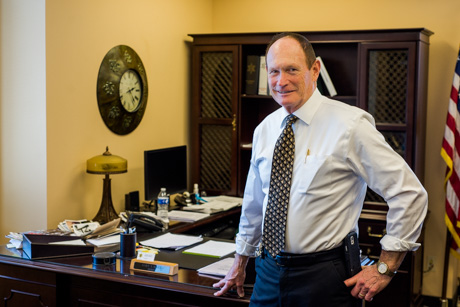
In the half century since Gary Maha started his law enforcement career, a lot has changed about being a cop.
There's the obvious changes -- digital communication, cameras, phones, computers. Then there are the changes of the mind, how society sees itself in the mirror and the role of the police officer in that looking-glass world.
Maha will miss some things about being in law enforcement, but he won't miss the stress.
"I just want to relax for a while," Maha said. "No more two or three o’clock in the mornings when the phone rings. You know it's not somebody checking to see how well you’re sleeping. It’s usually something that’s bad or something’s happened you need to respond to. I won't miss that kind of stuff, all the sleepless nights. I mean, I don’t sleep well at all at night because you’re always concerned and worried either one of your people are going to get hurt or something’s going to happen. You wait for the phone call."
Maha was handed his first straw Stetson, a badge and a .38-caliber revolver in 1967.
In 1967, Genesee County was still pretty much the world Gary Maha grew up in.
A child of Corfu, Maha remembers a village that was a chummy, tight-knit group. People left their keys in their cars, didn't lock their doors and the kids went to the local market or local diner for something to eat and just hang out. Or they played sports. There were no drugs. There were few children raised in single-parent homes or by grandparents. There was one deputy who patrolled the entire county during the night shift.
"Back in those days, you knew your neighbors," Maha said. "You know almost everybody who lived in the Village of Corfu at the time. That’s not the case nowadays with the transient population; people don’t know their neighbors like they used to."
Maha was the son of the man who ran the village court, the local justice of the peace. That's where he developed an interest in law enforcement. Discipline and integrity were traits Maha said he got from his parents.
"My mother was a stay-at-home mom and my father owned a greenhouse in Corfu and she worked a lot in the greenhouse but they were both home all the time," Maha said. "They weren’t strict parents, you know, but you got to follow the rules."
In high school -- it was Corfu High School, then -- there was more discipline and a touch of leadership experience. He played basketball and baseball and became the football team's starting quarterback.
In the early 1960s, the United States was just starting to get involved in Vietnam and Maha joined the Army. He served three years, including a 13-month tour in Korea, then returned home for college and an eventual job in the dispatch center of the New York State Police in Batavia.
It was, in that job, a year when Genesee County's undersheriff walked into the darkroom where Maha was developing photos for a trooper and suggested he apply for a job as a deputy.
A few weeks of training, a week of on-the-job training, and Maha became that lone patrolman prowling the county's back roads.
"I remember once going from Darien to Bergen to respond to an accident," Maha said. "By the time I got there, the guy’s still lying in the middle of the road."
Those were different times, but Maha was always steadfast in his integrity. When we talked about some of the things that have tripped up Sheriff's in other jurisdictions over the years, he recalled those who skimmed money or had sexual affairs and these transgressions cost them their jobs.
"I remember stopping a girl, and she’s out to do anything, anything to get out of the ticket mess and I said, 'I’m sorry. Here you are,' ” and Maha motions handing her a ticket.
Maha said he warns deputies they will face these temptations.
"That’s one thing I tell officers, too, you know," Maha said. "Don’t fall in the death trap because once that happens, they've got your career right there in their hands. They’re going to play that trump card when it’s good for them, not for you. I’m sure to tell all these guys -- because I did when I was a young deputy -- you will get propositioned."
Maha's reputation for integrity extends beyond the border of Genesee County. Rare among those in local law enforcement, he has a top secret clearance from the FBI. Every year, he teaches an ethics seminar through the New York Sheriffs' Association for new sheriffs. He tells them all the same thing, "you have to take care of things at home."
He's seen a sheriff become more enamored with his cottage at the lake than what was going on in his own county. He's also seen sheriffs who think they're on top of the world and can't be touched.
"They have a big ego and that comes back to haunt them and they lose elections," Maha said. "It's the same with a lot of people. They get involved with women or alcohol or greed sometimes. I remember a sheriff many years ago who was a good sheriff, well liked, but he had a drug seizure fund and he was using that to finance some of his personal expenses. He got caught, got charged and spent time in the federal prison -- stupid stuff."
Other sheriffs lose elections. Not Gary Maha. He ran every four years from 1988 to 2012 unopposed.
The route toward sheriff for Gary Maha may have started when his boss in 1972, Sheriff Frank L. Gavel, nominated him for a spot at the FBI Training Academy in Quantico, Va. Maha was accepted in his first year of eligibility. After five years in law enforcement, and at 28 years old, he was the youngest attendee.
"It's all the same courses that the FBI agents go through," Maha said. "You go through a lot of leadership courses, a lot of management courses including some operational type of courses, and it was three months away from home but it was well worth it."
By the time Maha arrived in Quantico, he was already an investigator handling some big cases.
The most memorable cases, of course, where the murder cases.
"I remember my first homicide case," Maha said. "It was over on Hundredmark Road. There was a fire in one of the shacks over there. We’re blocking off the road and a fireman found a skeleton, you know, a burned up, charred body inside.
"We had nothing to go on," Maha said. "We don’t know if it was male or female, and the way we finally identified it was female is she had an ankle bracelet on and there was a female missing out of Albion who had that type of ankle bracelet and that’s how we ended up first identifying her, and there was this guy from Oakfield. I won't mention (his name) because he did 25 years to life and he’s out. He picked her up and took her over there and he sexually abused her."
There were no witnesses and scant physical evidence, but Maha and the other investigators were able to piece things together, draw in statements the suspect made to a fellow inmate, and make a case and get a conviction.
The young investigator helped secure another conviction on a murder case that became a story in "Inside Detective," the once popular pulp magazine. In that case, two young men stopped at a gas station on Clinton Street Road, where an ice cream shop is now, and one of the men went inside to rob the attendant and the other drove down the street and then came back to pick up the robber.
The driver apparently had no idea his partner shot and killed the recent high school graduate from Bergen who was working that night.
"That was another tough case," Maha said. "The main perpetrator, the actual shooter, he was on parole and he was the coldest-blooded guy I ever met in my life. I mean, he shot this young kid, 18 years old, and he shot him on the back of the head and for robbery. I don’t think he got much money and (the victim) was a great kid, too. I knew his mother. That was just a senseless shooting. It was just cold-blooded."
The shooter was an immigrant from Poland and he was deported after serving his prison sentence. Maha doesn't believe his accomplice, who lived in Brockport, returned to the area after prison.
In 1977, Maha was promoted again, this time to chief deputy.
Today, the department has a chief deputy in charge of road patrol and another in charge of investigations, but in 1977, Maha was it. He supervised both divisions.
With the bearing and demeanor of the late actor Jack Palance, Maha is usually a man of few words who can be hard to get to know. Friends say he has a wicked sense of humor and at department gatherings, he clearly enjoys a good joke. After a community event a few years ago, his wife, Sue Maha, told a local photographer that he accomplished a rare feat -- capturing the stern-faced sheriff wearing a smile in public.
The Mahas obviously enjoy each other's company, even after nearly four decades of marriage and raising two children together. They are both members of Kiwanis and at just about any social event where one goes, they're both there.
For Gary, lasting romance came a bit late in life. He had already been with the Sheriff's Office for more than a decade when he met Sue.
He met her, of course, on the job. No, he didn't pull her over with the notion of giving her a ticket. Nor was the chief deputy fraternizing with the staff.
Sue traveled the region selling photo ID systems to law enforcement agencies and it was Maha's job to review the systems for the criminal division and make a recommendation for purchase.
"That’s when I met her and we fell in love and here it is 36 years later," Maha said.
A man of few words.
Maha never set out to be sheriff. He never sought the job, he said. He didn't even think he was the one who would get it when Doug Call stepped down from the position in 1988 and recommended Maha for the governor's appointment. The governor was Mario Cuomo, a Democrat, as was Call, and Maha is a Republican. He figured the job would go to another Democrat, but Call's recommendation persuaded Cuomo that Maha was the right choice.
While other departments have had their scandals and tragic line-of-duty incidents, Maha's Sheriff's Office has largely run smoothly over the course of his career.
He credits his command staff and the folks they supervise.
He may not be out in the field every day, but good communication combined with the knowledge he gained coming up through the ranks Maha said enables him to keep pretty good tabs on his deputies.
"Some of the guys probably don't realize it, because I'm up here and they are down there, but I know what's going down there," Maha said. "I get a feel for what's going on out there in the community. I hear what's on dispatch all the time and know what's going on. I stay in contact with my chief of road patrol every day. He stops in every day and we discuss things, what's going on. I've got a good bunch of people here. They are well trained, well equipped and well educated."
Becoming a deputy is a lot harder than it was in 1967.
Where it only took Maha a few weeks of training, and no civil service exam, before he was on patrol by himself, the process for a deputy just starting out today is about a year long.
New hires who want to make it to road patrol go through an extensive background check, hours of psychological evaluation, a polygraph, physical fitness and agility tests, and a medical checkup before they're even given a chance at training. And then they're sent to a law enforcement academy for six months before three months of on-the-job training.
It's a daunting process and a lot of men and women who try don't make it.
That's one reason Maha likes hiring military veterans when he can. They have a proven track record of self-discipline and they understand the command structure.
"It's very important you choose the right person," Maha said. "We are accredited. We are the only local law enforcement agency that is accredited. We have certain standards that you have to comply with and meet. Therefore, a selection of a deputy is very important. So even though we have civil service rules and regulations to comply with, you sometimes have to pick the best of the worst. You would like to get a better officer and mostly we do, but there have been a few who washed out."
For all his sleepless nights worrying about his deputies, there has been only one line-of-duty death during Maha's tenure. That was when Frank Bordonaro passed away in his sleep following back-to-back nights of stressful calls -- a house fire in Le Roy and an ugly, fatal accident in Byron.
"That was tough on the department because Frank was a well-liked guy," Maha said. "He was great at his job, a super guy, very friendly, outgoing, and it was a shock to all of us when that happened. It hit the department hard."
It's also hit Maha hard when he's had to fire people under his command. It's not always an easy thing to do, he said. Most recently, he had to terminate a corrections officer for allegedly engaging in sexual acts with a female inmate. That was tough.
"You know, he has a small child, he's married, so that was difficult," Maha said. "I liked the guy. Some of these guys, you know, they're not deserving (of the job), you know, 'you're out of here,' but he's a decent guy and I hated to have to discipline him and let him go, but you have to."
Maintaining order and discipline is a bit of swimming against the tide of the times, which is another reason Maha has continued to emphasize integrity in deciding who gets hired and who stays.
One of the biggest changes Maha has seen over the course of his career is the decline in respect for law enforcement.
"Things have changed as far as crime goes," Maha said. "You know, drugs made a big change, gangs, you know, and I think respect not for just law enforcement but for authority, teachers, or whatever. It’s not just there anymore. There are a lot of broken homes where children are raised by one of their grandparents or no adults. It’s totally different."
So it's not totally a bad time to step aside for a guy who started out as a cop when people could still leave the keys in a car's ignition. He knows that.
That doesn't mean Maha thinks the job is impossible or can't be rewarding for the young ones coming up through the ranks. He tells them, "just do the right thing."
"Don't take any shortcuts," he said. "Make sure you follow the law and be honest. Keep your honor and just be held to a higher standard."
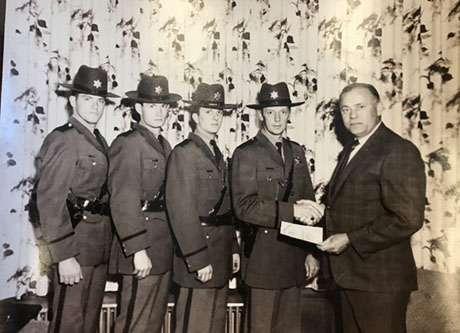
Gary Maha, second from left, being welcomed to the force with three other new deputies by Sheriff Frank L. Gavel.
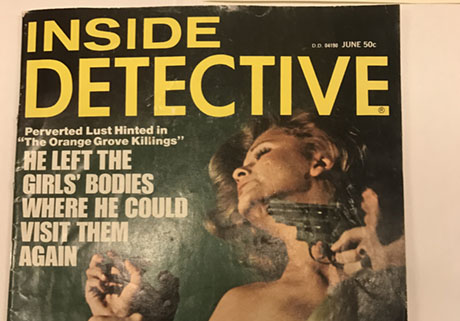
The cover of the "Inside Detective" issue that included a story about a murder in Batavia that was investigated by Gary Maha.
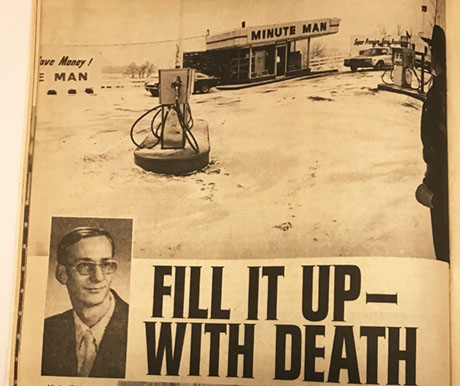
The first page of the story about the murder at the Minute Man gas station on Clinton Street Road, Batavia.
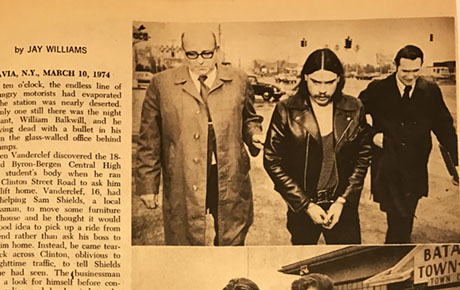
Gary Maha, far right, in a photo in "Inside Detective," with another investigator and a suspect in the murder.
Photos: Retirement party for Sheriff Gary Maha
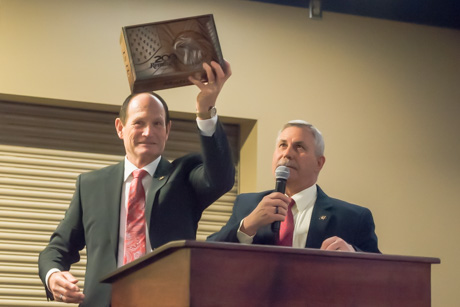
More than 350 people attended Sheriff Gary Maha's retirement party at Batavia Downs on Saturday night and Maha was feted with more than a dozen gifts, certificates and plaques.
Maha started his career in law enforcement as a dispatcher and film processor for the State Police 50 years ago. After a year with the State Police, the undersheriff of Genesee County invited Maha to apply for a deputy's position and he's been with the Sheriff's Office ever since.
He never set out to become sheriff, he said, and when Doug Call announced his retirement, he thought the appointment by Gov. Mario Cuomo would go to a fellow Democrat, but based on Call's recommendation (Call was a Democrat), Maha was appointed to the position. Maha never faced any opposition in any election.
Maha's final term ends Dec. 31 and Undersheriff William Sheron will become sheriff.
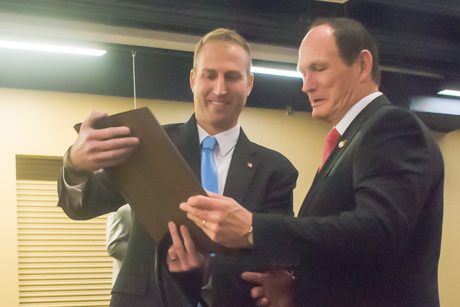
Livingston County Sheriff Thomas J. Dougherty presents a plaque to Maha.
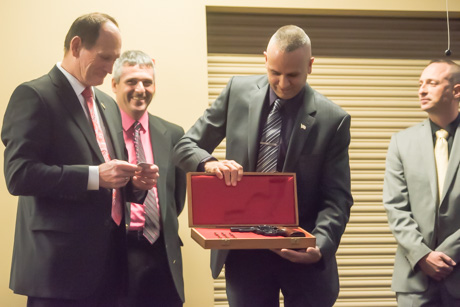
The County's Deputy Sheriff's Association presented Maha with a Smith & Wesson .38 revolver, exactly like the one he would have carried as his first service revolver. They also presented him with an updated permit to include the revolver.
Lauded as a 'Sheriff's Sheriff': Maha gets most prestigious award given by NY Sheriffs' Institute
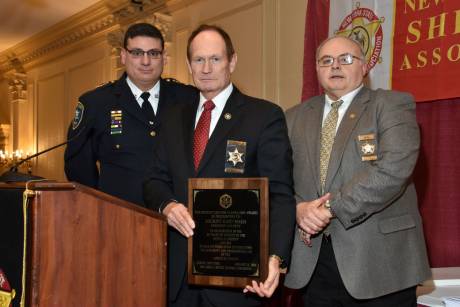
Submitted photo: Sheriff Gary Maha of Genesee County, center, proudly displays the Sheriff Grover Cleveland Award. He is only the fifth Sheriff to receive this prestigious statewide award. Sheriff James Voutour of Niagara County, left, and Sheriff Ron Spike of Yates County made the presentation on behalf of the Sheriffs’ Institute.
Press release:
Sheriff Gary Maha of Genesee County has received the New York State Sheriffs’ Association Institute's most prestigious award, the Sheriff Grover Cleveland Award.
On only five occasions has the Sheriffs’ Institute leadership presented the highest honor that can be given a sitting New York State Sheriff -- the Sheriff Grover Cleveland Award.
The previous winners – in order – are Sheriff James Bowen, Saratoga County, Sheriff John York, Livingston County, Sheriff Kevin Walsh, Onondaga County and Yates County Sheriff Ron Spike. (All but Sheriff Spike are retired.) Between those four men, they have served almost 125 years in the Office of Sheriff. When you add Sheriff Maha’s tenure as Sheriff the total jumps to over 150 years in the Office of Sheriff.
Maha became a Genesee County Deputy Sheriff in 1967. Two years later he was promoted to Senior Investigator. In 1977, he was promoted to Chief Deputy in charge of criminal investigations. In January of 1988, he was appointed interim Sheriff. He has since been elected to seven terms as Sheriff.
His accomplishments and contributions to public safety are not limited to Genesee County. Sheriff Maha has been very active in both state and national issues dealing with public safety.
On the local level particularly noticeable contributions under Sheriff Maha’s tenure has been the implementation of the state-of-the-art Enhanced 9-1-1 Emergency Communications Center, the very effective joint drug task force with the City of Batavia and Village of Le Roy police departments and the positive culture of cooperation that has been built amongst all the county law enforcement agencies and law enforcement officers working in Genesee County.
Sheriff Maha is a past president of the New York State Sheriffs’ Association and currently serves as chairman of that organization’s Executive Committee. Governors from both parties have appointed him to criminal justice committee’s and councils including the Law Enforcement Accreditation Council, New York State Interoperable & Emergency Communications Board and the New York State Committee on Counter Terrorism.
On the national level Sheriff Maha is very active with the National Sheriffs’ Association. He serves as vice-chair of the National Sheriffs’ Criminal Justice Information/Technology Committee and is a member of the organization’s Homeland Security Committee.
Sheriff Maha is a graduate of the FBI National Academy in Quantico, Va. He holds an associates degree in Political Science and bachelor’s degree in Criminal Justice.
“Sheriff Gary Maha, who is the state’s longest-tenured Sheriff, is known not only in New York State, but at the national level as a 'Sheriff's Sheriff', said Sheriff Ron Spike, Yates County, upon presenting the Sheriff Grover Cleveland Award to Sheriff Maha.
(Maha announced last month that he will not seek reelection when his term expires Dec. 31, ending his 27-year run as Genesee County's top cop.)
Sheriff Maha elected chairman of Executive Committee of NY State Sheriffs' Association
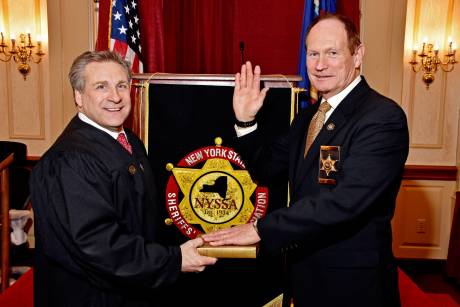
Submitted photo: Genesee County Sheriff Gary Maha (right) is sworn in as chairman of the Executive Committee of the NYS Sheriffs' Association by Herkimer County Judge John Brennan at the installation of officers at the Association's 82nd Annual Winter Training Conference at the Desmond in Albany this week.
Press release:
The New York State Sheriffs' Association elected its Executive Committee at the 82nd Annual Winter Training Conference this week at the Desmond Hotel in Albany.
Members elected Genesee County Sheriff Gary Maha Chairman of the Executive Committee. Sheriff Maha will work with the newly elected President of the Association, Herkimer County Sheriff Chris Farber, and sheriffs around the state, to further the efforts of the Sheriffs' Association to enhance public safety in New York State through professional training and accreditation programs, public safety programs, and advocacy.
The New York State Sheriffs' Association, Inc., is a not-for-profit corporation, formed in 1934, for the purpose of assisting sheriffs in the efficient and effective delivery of services to the public. It comprises all of the elected and appointed sheriffs of New York State.
Gary Maha won't seek re-election as Sheriff
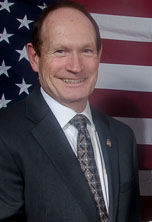
Genesee County Sheriff Gary T. Maha announced this morning that he will not seek reelection for another term.
Maha intends to finish his current term, which expires Dec. 31, and is expected to retire, ending a 27-year run as Genesee County's top cop.
That is the longest tenure for a sheriff in county history, and Maha is currently the longest-serving sheriff in the state.
Maha started his career with the Sheriff's Office in 1967 and moved up through the ranks until his appointment as sheriff in 1988 by then Gov. Mario Cuomo.
Sheriff Maha releases statement in wake of NYC police officers' murder
Sheriff Gary Maha released the following statement:
Chemung County Sheriff Chris Moss, president of the New York State Sheriffs’ Association, today released the following statement regarding the murder of two NYPD Officers.
“The New York State Sheriffs Association, and all the Sheriffs of New York State, mourn the tragic loss of two New York City Police Officers, Rafael Ramos and Wenjian Liu, who were assassinated Saturday afternoon for no reason other than the fact that they were police officers. These senseless killings follow closely on the heels of senseless anti-police comments by some politicians and so-called community leaders, and the connection between the two events is inescapable. When our leaders, with their careless words, show disrespect for our police officers it is inevitable that some unsavory segments of society will see that as their cue to take violent action against the dedicated men and women who only seek to serve and protect. The blood of Officer Ramos and Officer Liu should weigh heavily on the consciences of those who, through their demagoguery and irresponsible statements, have recently fueled an anti-police sentiment in our cities, our State and Nation.”
“The Sheriffs of New York call upon Mayor DiBlasio, Attorney General Schneiderman, Governor Cuomo, and President Obama to consider very carefully the words they use in discussing the serious criminal justice issues of our day, and to be aware that what they say can have serious consequences. Words can kill.”
“The Sheriffs of New York call upon all community leaders to consider what kind of a community they will have if there are no police there to protect and serve them, their friends and neighbors. Decry those leaders who would inflame a situation to promote themselves and their personal agendas. Work to bring your community and your police officers closer together, not further apart.”
“The Sheriffs of New York call upon the media to be more cautious in their coverage of serious events when that coverage has the potential of inciting violence. Facts may not be as interesting as fiction, but it is irresponsible to continually repeat wrong or misleading assertions by those with an agenda, contrary to known or easily discoverable facts. Complex legal issues, such as the theory and operation of the Grand Jury, are not easily digested for reporting to the masses, but an attempt should be made. The daily good work of our police officers deserves to be reported as much as the rare misdeed.”
“The Sheriffs of New York call upon all our citizens to give their support to our police officers under siege. As you are putting presents under your tree, some police officer will be putting on his bulletproof vest to go out into the night, to make sure you and your family remains safe. As you are enjoying the company of family and guests, the family of some on-duty police officer will be wondering, 'Could this be the day that he does not come home to us?' When you see a police officer this week, thank him or her for all they do for us, and wish the officer a Merry Christmas!”
The New York State Sheriffs Association, Inc. is a not-for-profit corporation, formed in 1934, for the purpose of assisting sheriffs in the efficient and effective delivery of services to the public. It comprises all of the elected and appointed sheriffs of New York State. The Sheriffs Association is committed to providing education and training to advance the professionalism of all aspects of the office of sheriff. Visit www.nysheriffs.org.
Sheriff tells SCOPE members that SAFE Act enforcement is a matter of officer discretion
A police officer doesn't always need to write a ticket after making a traffic stop, nor does an officer need to arrest somebody suspected of violating the SAFE Act, Sheriff Gary Maha told members of Genesee County SCOPE at a packed meeting Tuesday night.
Maha said he's obligated under the oath of his office to uphold the law and if the Sheriff's Office receives a complaint about a possible violation of the SAFE Act, a deputy is required to investigate the complaint. It will be up to the deputy to decide whether an arrest is in order.
"An officer has the ability to exercise discretion and that's what we're going to do in Genesee County," Maha said.
His comments prompted applause from SCOPE members.
Maha, along with County Clerk Don Read, Assistant District Attorney Will Zickl and Undersheriff William Sheron were guests of SCOPE at its regular monthly meeting.
Zickl opened the discussion by recapping a recent court decision by U.S. District Court Judge William M. Skretny upholding much of the SAFE Act, or as Zickl called it repeatedly, "the so-called SAFE Act," and overturning others.
Skretny ruled the ban on assault rifles constitutional but threw out the limit on seven rounds in a magazine.
Zickl said the ruling was full of flawed logic.
"I hope there is some other court somewhere who tells him so," Zickl said.
The ruling only applies to the jurisdiction of Skretny's court, which is Western New York.
Read spent some time discusing a provision of the SAFE Act that requires all pistol permits to be recertified every five years.
The process, especially the first time around, is going to be burdensome and bureaucratic and to help get a jump on the process, the state is going to start sending out letters to pistol permit holders soon telling them to apply immediately for recertification. The first pilot project will begin soon in Albany County.
However, what the letters won't tell the holders, nor will any other state literature on the topic, Read said, is that recertification isn't required until 2018.
Read said he doesn't know what the state will do if permit holders simply don't respond to the early recertification request.
The state recently contacted all county clerks and asked if the clerks would like the county seal placed on letterhead sent to pistol permit holders informing them of the recertification process. Read said he told state officials no, but he and other county clerks are concerned the state will use county seals anyway.
Courtland County's Legislature has approved a resolution telling the state not to use its seal. Ray Cianfrini, the new chairman of the Genesee County Legislature, told SCOPE members that the local body will take up a similar resolution and he expects it to pass easily.
That brought another round of applause from SCOPE members.
SCOPE President Bill Fox raised a concern about a provision in the law that would require any pistol permit holder who loses his or her permit for any reason to turn in to State Police all of his or her guns, even rifles and shotguns.
"It's like a backdoor to take away the rest of your guns," Fox said.
Zickl said, "It's a very substantial and very troubling amendment to the law," adding, "you don't have to be too paranoid to be worried about that section of the law."
During his remarks, Maha noted that the governor proudly trumpeted a few weeks ago that so far there have been 1,291 arrests under the SAFE Act in New York.
"What he doesn't tell you is 1,029 were made in New York City," Maha said.
There have been no SAFE Act arrests in Genesee County, Maha said, and only a couple in the neighboring rural counties.
"The law doesn't make sense for Upstate," Maha said. "It was written by the people in New York City who don't know anything about guns because all they know is Downstate and down there guns kill people, so guns are evil. That's not true for us. We were brought up with guns. We hunt with them. We shoot targets with them, but that's not true if you're in New York City."
Sheriff Gary Maha, County Clerk Don Read and Assistant District Attorney Will Zickl.
A hand raised above the crowd during a Q&A portion of the meeting.
Bob Wilson asked a couple of questions, including asking why Genesee County doesn't secede from the rest of New York. Ray Cianfrini, chairman of the Legislature, encouraged SCOPE members to support Assemblyman Steve Hawley's bill, which Hawley introduces every year, calling for a referendum on splitting New York in two. When the question was repeated, Cianfrini said, with a touch of a smile, "I don't think Genesee County will be seceding by itself."
Also, tomorrow, on the one year anniversary of the SAFE Act becoming law, one member of SCOPE said everybody who supports repeal of the SAFE Act should call the governor's office tomorrow and respectfully request the SAFE Act be repealed. The governor's office phone number is (518) 474-8390.
Sheriff Maha issues statement on passage of SAFE Act
From Sheriff Gary Maha:
I have been receiving numerous inquiries in reference to what is the New York State Sheriffs' position with regard to the NY SAFE Act.
Fifty-two of the 58 Sheriffs met during our annual winter conference last week in Albany, NY, and discussed this legislation at length. There are a number of provisions in the law that the Sheriffs find to be helpful to law enforcement and to our citizens. However, there are also a number of provisions which cause us concern, and which we think should be revisited by the Governor and State Legislature. The Sheriffs of New York State are willing to work with the Governor and State Legislature as revisions and additions to the NY SAFE Act are considered.
Attached is the position statement of the New York State Sheriffs with regard to the NY SAFE Act. This position statement was sent to the Governor and State Legislative leaders.
Collins joins Genesee County officials for swearing in ceremony at Old Courthouse
Elected officials from national, state and county government were at the Old Courthouse today for both a ceremonial and official swearing in for office.
For Rep. Chris Collins, State Sen. Mike Ranzenhofer and Assemblyman Steve Hawley, taking the oath in Batavia today was ceremonial. But for Sheriff Gary Maha, Treasurer Scott German, coroners Donald Coleman and Karen Lang, along with Undersheriff William Sheron and Deputy Treasurer Matt Landers, the oath was official.
Collins spoke briefly about his commitment to representing the people of the 27th Congressional District, hearing the concerns of voters, especially in Genesee County, and working in Congress to help control spending and bring down the deficit.
"My job in representing this district is that we stand up for our children and grandchildren to get spending under control, to get our deficits down to zero in some reasonable time, like 10 years, and grow the economy," Collins said.
He promised that the people of Genesee County will see him frequently in the county.
Prior to the ceremony, Collins took his wife, Mary, daughter, Caitlin, son, Cameron, and staff members to a no-media lunch at the Pok-A-Dot. Collins has referred to the Pok-A-Dot as a good-luck charm, dining there on election day for the primary and general elections, but when he showed up today, he reportedly told people there that he wanted a chance to enjoy lunch with his family without cameras around.
Sheriff Gary Maha takes the oath, administered by Assemblyman Steve Hawley, as wife Susan Maha holds the Bible.
Above, Coroner Donald Coleman, who has served in the position for 21 years, takes the oath of office.
To purchase prints of the photos in the slide show, click the link in the upper left of the slide show.
GC sheriff elected to NY State Sheriffs' Association Executive Committee
Press release:
ALBANY -- The New York State Sheriffs’ Association held its election and installation of executive committee members and trustees at its 78th Annual Mid-Winter Training Conference. Members elected Genesee County Sheriff Gary T. Maha to the executive committee.
Sheriff Maha was appointed Interim Genesee County Sheriff in 1988 by then-Governor Mario Cuomo, after a 21-year career with the Sheriff’s Office. He has been elected for six successive terms since then.
Sheriff Maha is a past president of the New York State Sheriffs’ Association and is currently vice chair of the National Sheriffs’ Association’s Criminal Justice Information Systems/Technology Committee.
He is also a member of: the National Sheriffs’ Association’s Homeland Security Committee; the New York State Law Enforcement Accreditation Council; the New York Interoperable Communications Board; and the New York State Executive Committee on Counter Terrorism.
Sheriff Maha will work hand-in-hand with the newly elected president of the Sheriffs’ Association, Sheriff Donald Smith, of Putnam County, and sheriffs across the state to strengthen law enforcement, specifically by advocating the following goals that association members adopted at their meeting:
- Support the All Crimes DNA bill, which requires all individuals arrested for a crime to have their DNA placed in the state DNA bank.
- Oppose a House transportation bill in Congress that would, among other things, allow triple tractor-trailers on interstate roads,making our highways less safe.
- Join with the NYS Association of Counties to urge state officials to alleviate the burden on local jails of housing parole violators in county jails because this is an unfunded mandate and parole violators are a state responsibility.
- Join with the NYS Association of Counties to gain for the counties a greater portion of the revenues from the NYS public safety surcharge to support county-level 9-1-1 communications projects; i.e. the purpose for which the surcharge was created.
The full slate of trustees and committee members selected at this year's conference are as follows:
Executive Committee:
Chairman, Livingston County Sheriff John M. York
Genesee County Sheriff Gary T. Maha
Onondaga County Sheriff Kevin E. Walsh
Orange County Sheriff Carl E. DuBois
Oswego County Sheriff Reuel A. Todd
Rensselaer County Sheriff Jack Mahar
Warren County Sheriff Nathan “Bud” York
Trustees:
Chautauqua County Sheriff Joseph A. Gerace
Montgomery County Sheriff Michael J. Amato
Wayne County Sheriff Barry Virts
The New York State Sheriffs’ Association, Inc., is a not-for-profit corporation, formed in 1934, for the purpose of assisting sheriffs in the efficient and effective delivery of sheriffs’ services to the public. It comprises all of the elected and appointed sheriffs of New York State.
Sheriff concerned about 'minimum force' bill in Assembly
Sheriff Gary Maha calls a pending Assembly bill which would require cops to shoot a suspect only to wound him -- presumably aiming for an arm or a leg -- "ridiculous."
The so-called "minimum force" bill says, "(a peace officer or police officer) uses such force with the intent to stop, rather than kill, the person who he or she reasonably believes is using unlawful force, and uses only the minimal amount of force necessary to effect such stop."
No shooting course teaches law enforcement officers to aim at limbs, Maha noted.
The first job of a cop in a dangerous situation is to protect himself and the people he's sworn to serve, Maha said.
"Deadly physical force, under the (current) law, can only be used as a last resort, under extreme circumstances," Maha told WBTA. "You're going to put more pressure on the officer if he has to shoot to wound. You're putting that officer in jeopardy."
Under provisions of the bill, any officer accused of shooting to kill another person in the line of duty would be charged with manslaughter.
The bill is sponsored by Annette Robinson (D-Bedford Stuyvesant) and Darryl Towns (D-East New York).
While the "minimum force" bill hasn't died, it is languishing in committee and is still drawing reaction from New York's law enforcement community.
A New York detective told the New York Post that the bill would create a situation where cops are expected to shoot the gun out of the hands of suspect, while the criminal would still be firing with the intent to kill. It's been called the "John Wayne" bill because it requires a level of accuracy only seen in Hollywood Westerns.
"These are split-second, spontaneous events -- and officers have to make a full assessment in a fraction of a second," said an angry Michael Paladino, president of the Detectives Endowment Association.
The bill was drafted in response to the shooting death of Sean Bell, a man who was killed by police following a fight at a strip club where he was celebrating his bachelor party. An undercover officer reportedly heard Bell say at some point that he had a gun. In the melee that followed, Bell reportedly slammed his Nissan into a police vehicle.
Photo: File photo of Sheriff Gary Maha.
Mobile phone surcharge not funding emergency dispatch as intended, Sheriff says
If you have a mobile phone in New York, each month you pay a $1.20 surcharge for "New York State Public Safety" that you might think goes to pay for emergency dispatch.
If you think that, you're mistaken, according to Sheriff Gary Maha.
Last year, the surcharge generated $210 million in revenue, of which about $9 million was allocated to dispatch centers.
The balance of the fund, Maha said, goes straight into the state's General Fund for any number of non-law-enforcement related purposes.
Last year, Genesee County -- which spends $2 million each year to operate its dispatch center -- received just $38,000 from this fund.
“We need to keep the pressure on the state that this money should be used for what it’s intended for and not used to pay for general fund expenses," Maha told the County's Public Safety Committee today.
The committee passed a draft resolution to send to the State Legislature asking them to use the money according to its intended purposes.
The fund used to be called the 9-1-1 Surcharge, but even with the "public safety" label, the revenue is rarely being used to pay for public safety expenses, Maha said.
There is also a county-collected 35-cent surcharge on landlines for the dispatch center. But increasingly, people are abandoning landlines in favor of mobile phones, cutting down significantly on the amount of revenue this fund generates, Maha said.
Governor Paterson has proposed that $50 million from the surcharge monies, or about 21 percent, be made available to county 9-1-1 centers, Maha said.
The proposal has met with stiff opposition in the State Legislature.
The State Assembly proposes that only $8 million above last year's $9.3 million funding be provided to county 9-1-1 centers. Many think that the Legislature will take all of these monies to help fill the approximately $9 billion budget deficit facing the state, Maha said.
Cell-phone tax not supporting 9-1-1 service as intended
Would it surprise anybody that New York has a tax that raises tens of millions of dollars that doesn't go to its intended use?
The buck-twenty you pay every month on your cell phone bill to pay for 9-1-1 service isn't supporting the intention, according to the Buffalo News.
Genesee County Sheriff Gary Maha is quoted:
“Basically, they’re using that money as general revenue,” said Genesee County Sheriff Gary T. Maha, whose office oversees 911 operations. “We have not seen any of that money.”
With these startling numbers:
The surcharge — raised in 2002 to $1.20 per month — has generated about $600 million over 15 years, but just $84 million has gone to the municipalities that operate 911 centers, the State 911 Coordinators Association found.
Area political leaders call attention to new gun legislation making its way through Albany
Four prominent area elected officials -- all Republicans -- gathered on the steps of the old Genesee County courthouse today to call attention to legislation that shows every sign of being enacted that will curb the rights of law-abiding gun owners.
Sen. Mike Ranzenhofer led the press conference, which included Assemblyman Steve Hawley, Sheriff Gary Maha and County Clerk Don Read.
The four men underscored three key points: The legislation will do nothing to curb crime, it is out of step with the interests of upstate New York, and it will burden county governments with yet one more unfunded mandate.
While there are more than a dozen new gun restrictions being pushed by legislative Democrats, the key piece of legislation under fire by Ranzenhofer today would require the renewal of gun carry permits every five years.
Both Ranzenhofer and Hawley noted that such legislation will do nothing to deter criminals, who don't bother with gun permits anyway.
"Basically what you have legislators from New York City who feel it might be appropriate in their community trying to impose their New York City will on Genesee County," Ranzenhofer said.
Here are five related documents (PDF):
- Ranzenhofer Press Release
- Hawley Press Release
- Don Read Press Release
- Gun Permit Legislation
- Roll Call of Assembly Vote on Legislation
I had a couple of video problems -- sound, misbehaving tripod, chiefly -- with covering the press conference today, but the worse problem is that I had to change tapes (it seem that long ago that I started a new tape) during the PC, and that tape somehow did not make it home with me tonight for editing. Below is what little video I have available now, where in Ranzenhofer, at the very end, sums up some of the key points of opposition to the legislation.
UPDATE 5/4/09: I got ahold of the other tape and pulled off what was recoverable, which was statements by Hawley, Maha and Read

